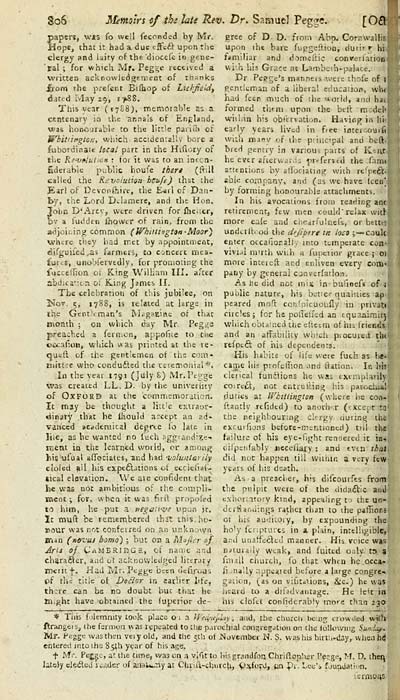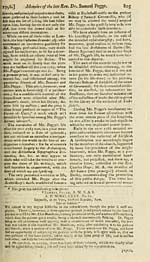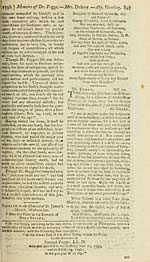Download files
Complete book:
Individual page:
Thumbnail gallery: Grid view | List view

8o6
papers
Mem!>ln cf th late Rev. Dr. Samuel Pegge. [05
wjs fo we'll feconded by Mr.
ope, that it had a due tS<^& upon the
clergy and laity of the "diocefe in gene-
ral ; for which Mr. Feg^e received a
written acknowltdgf rnent of tn«nks
irom fhe prefent Eifljop of LuhfieUt^
dati-d May 29, i-|k8S.
This vtar (lyiJS), memorable as a
centenary in the annals of England,
was honourable to the little paritft of
WbitrifgiOK, wiiich acctdentallv bore a
fubordinate loea/ pzrt in the Hiflory of
the Ri-Liit,'ut.o>i : toi it was to an inrcn-
Sderable puTjlic houfe there (ftill
called the Ksvolution- bcufe) that the
Ear! of DevonSiire, the E^il cf Dan-
by, the Lord Dwlamere, and ths Hon.
John D'Arcv, were driven for fiie.ier,
bv a fudden ihowcr of rain, from the
sidjoii.inj^ common (Whiitiigtan-Moor)
where they had rr.ct by .ippointinent,
eifguiiTed.-as farmers, to cjncert niea-
tuics, unobfervedly, for promoting the
fuccelhon 01 King William III. after
abdica-itr. or King James II.
The celebration of this jubilee, on
Nov. 5, 1788, is related at large in
the Ger.t'iman's M.gaEinc of that
month ; OH which day Mr Pegja
preached a fernion, apporne to cue
ciiiarion, wiiich was printtd at the re-
queft of the gent'emen of the com-
mittje who condufted the ctremoiiial*.
In the vear 1791 (July £) Mr.Pto;ge
was created LL. D. by the univeriuy
of Oxford at the comrrismoration.
It may be thought a liit'e extraor-
dinary that he ihould a:cept an ?.d.
vaiiced academical degree io late in
liie, as he wanted ro I'tich sggtiiu-i-z^-
rnent in the learned world, or amonjE;
his ul'ual affociates, and had 'voluntayily
doled siil his exptftjtions of eccieiiaC-
tical elevation. We aie confident that
he was not ambitious of the compli-
ir.ent ; for. v\ hen it was firft propofed
to him, he put a fiegati've iipun jc.
It muft be remembered that this.hc-
tiour was not conferred on an unknown
man (noz^ui homo) ; but oa a Mfficr of
Arts of Cambridge, of name .md
charafter, aad ot acknowledged literary
merit f. Had Mr. Ptgge bc=n dciu-ous
pf the title ot Dedor in earhtr life,
there can be no doubt bat that he
ln:^ht have obtained the fuperior de-
* Tills f olemnity took plact o ; a ljeunej<l.iy , and, the cliurch be.nn; irowtieJ with
ftrangciSj the fcrmon was rtpeated to tlie p.iroclrial congregation on tlic toUowing Sun.L^.
Mr. l^egge was then veiy old, and the jth of jNovember N. S. was his birtu-day, wiienhe:
entered into the 85th year of his age.
t A^'". Pufi^c, at tlie time, was cri a vJAt to liif. grandfon Chriftopher T'?D;gff, M. D. iheq
latciy cledted reader of anaU^ny at ChiiiWhnrch, V-^fofd, pn pr. Lee';, fou.adation.
Aermour
gree of D- D. froni Abp. Cornwallis
upon the bare fugseftion, durirj hi
familiar and d^.mellic converfatioii
wi'h liis Grace at Lambeih-palace.
Dr Peege's man.neis vere thnfe of ;
gentleman of a liberal education, wlx
had fecn much of the world, and hn
formed them upon the btil m.del'
wiihin his obkrvation. Having in hi
early years lived in f.ee i/irei.oaifi
with ma"y of the princpal and beft
bred pentry in various paits of K'ut
he ever afierw.u.is pr-fervtd the f.-irai
attfntions by airociatinj^ with rc''pe£'t.
able coimpany, and (as we have ken]
by forming honourable attachments.
In his avocations from reading ant
retirement, few men could" relax wiif
more eafe and ciiedrfuliiefs, or bttt-:
undv-rlb od the dejiptrt in loco ;— couk
enter occalior.ali y into temperate cuH'
vivi.il nurth wiih a fupevior grace ; 01
mote inteieft ard enliven every com-
paiiy by gtneral cjnvtrfation.
As l)e did not mix in buiinefs of ;
pui)lic nature, his hcVf (jualuies ap
peared mofl ccnfpicuoufly in privat(
circles; for he poffeifed an tquaiurrii;5
which obtained the ehecm of hii friencs
and an affability wh'ch piocured tiu
refptft of his dependents.
His habits of life were fuch as he-
cagie his profelTion ;ind Iktion. In hi-
clerical fundUons he was excmplarib
coire£f, not entrutlins^ his parod.;^.!
duties at Ifhitiington (where he co.i-
ftantly refidtd) to anorh-x (• xcept r:
the neighbouring cirrgy outing thi
excuifions bcfore-msntioned) til! the
failure of his eye-fight ren-Jered it in-
fiilpeiifably necefiafy ; and evtn thai.
did not happen till v.'ithir. a very few
ytars of his death.
As a preacher, his difcourfes from
the pulpit were of the didaftic and
exhorutory kind, appcaiirg t ■ the un-
derriandings rather than to the patTiors
of his auditory, by expounding the
holy fcriptures in a plain, intelligible,
ar.d unaffc6leu manner. His voice was
njturaily w<.ak, and fuittd o.ily tD a
fmall church, fo thjt whtn he occa-
fijnally appe^tred before a large congre^
gation, (as on vifjtuxions, &c.) he was
iicard to a difadvantage. He lett in
\\\i cloftt conliderabty mors th^n 230
papers
Mem!>ln cf th late Rev. Dr. Samuel Pegge. [05
wjs fo we'll feconded by Mr.
ope, that it had a due tS<^& upon the
clergy and laity of the "diocefe in gene-
ral ; for which Mr. Feg^e received a
written acknowltdgf rnent of tn«nks
irom fhe prefent Eifljop of LuhfieUt^
dati-d May 29, i-|k8S.
This vtar (lyiJS), memorable as a
centenary in the annals of England,
was honourable to the little paritft of
WbitrifgiOK, wiiich acctdentallv bore a
fubordinate loea/ pzrt in the Hiflory of
the Ri-Liit,'ut.o>i : toi it was to an inrcn-
Sderable puTjlic houfe there (ftill
called the Ksvolution- bcufe) that the
Ear! of DevonSiire, the E^il cf Dan-
by, the Lord Dwlamere, and ths Hon.
John D'Arcv, were driven for fiie.ier,
bv a fudden ihowcr of rain, from the
sidjoii.inj^ common (Whiitiigtan-Moor)
where they had rr.ct by .ippointinent,
eifguiiTed.-as farmers, to cjncert niea-
tuics, unobfervedly, for promoting the
fuccelhon 01 King William III. after
abdica-itr. or King James II.
The celebration of this jubilee, on
Nov. 5, 1788, is related at large in
the Ger.t'iman's M.gaEinc of that
month ; OH which day Mr Pegja
preached a fernion, apporne to cue
ciiiarion, wiiich was printtd at the re-
queft of the gent'emen of the com-
mittje who condufted the ctremoiiial*.
In the vear 1791 (July £) Mr.Pto;ge
was created LL. D. by the univeriuy
of Oxford at the comrrismoration.
It may be thought a liit'e extraor-
dinary that he ihould a:cept an ?.d.
vaiiced academical degree io late in
liie, as he wanted ro I'tich sggtiiu-i-z^-
rnent in the learned world, or amonjE;
his ul'ual affociates, and had 'voluntayily
doled siil his exptftjtions of eccieiiaC-
tical elevation. We aie confident that
he was not ambitious of the compli-
ir.ent ; for. v\ hen it was firft propofed
to him, he put a fiegati've iipun jc.
It muft be remembered that this.hc-
tiour was not conferred on an unknown
man (noz^ui homo) ; but oa a Mfficr of
Arts of Cambridge, of name .md
charafter, aad ot acknowledged literary
merit f. Had Mr. Ptgge bc=n dciu-ous
pf the title ot Dedor in earhtr life,
there can be no doubt bat that he
ln:^ht have obtained the fuperior de-
* Tills f olemnity took plact o ; a ljeunej<l.iy , and, the cliurch be.nn; irowtieJ with
ftrangciSj the fcrmon was rtpeated to tlie p.iroclrial congregation on tlic toUowing Sun.L^.
Mr. l^egge was then veiy old, and the jth of jNovember N. S. was his birtu-day, wiienhe:
entered into the 85th year of his age.
t A^'". Pufi^c, at tlie time, was cri a vJAt to liif. grandfon Chriftopher T'?D;gff, M. D. iheq
latciy cledted reader of anaU^ny at ChiiiWhnrch, V-^fofd, pn pr. Lee';, fou.adation.
Aermour
gree of D- D. froni Abp. Cornwallis
upon the bare fugseftion, durirj hi
familiar and d^.mellic converfatioii
wi'h liis Grace at Lambeih-palace.
Dr Peege's man.neis vere thnfe of ;
gentleman of a liberal education, wlx
had fecn much of the world, and hn
formed them upon the btil m.del'
wiihin his obkrvation. Having in hi
early years lived in f.ee i/irei.oaifi
with ma"y of the princpal and beft
bred pentry in various paits of K'ut
he ever afierw.u.is pr-fervtd the f.-irai
attfntions by airociatinj^ with rc''pe£'t.
able coimpany, and (as we have ken]
by forming honourable attachments.
In his avocations from reading ant
retirement, few men could" relax wiif
more eafe and ciiedrfuliiefs, or bttt-:
undv-rlb od the dejiptrt in loco ;— couk
enter occalior.ali y into temperate cuH'
vivi.il nurth wiih a fupevior grace ; 01
mote inteieft ard enliven every com-
paiiy by gtneral cjnvtrfation.
As l)e did not mix in buiinefs of ;
pui)lic nature, his hcVf (jualuies ap
peared mofl ccnfpicuoufly in privat(
circles; for he poffeifed an tquaiurrii;5
which obtained the ehecm of hii friencs
and an affability wh'ch piocured tiu
refptft of his dependents.
His habits of life were fuch as he-
cagie his profelTion ;ind Iktion. In hi-
clerical fundUons he was excmplarib
coire£f, not entrutlins^ his parod.;^.!
duties at Ifhitiington (where he co.i-
ftantly refidtd) to anorh-x (• xcept r:
the neighbouring cirrgy outing thi
excuifions bcfore-msntioned) til! the
failure of his eye-fight ren-Jered it in-
fiilpeiifably necefiafy ; and evtn thai.
did not happen till v.'ithir. a very few
ytars of his death.
As a preacher, his difcourfes from
the pulpit were of the didaftic and
exhorutory kind, appcaiirg t ■ the un-
derriandings rather than to the patTiors
of his auditory, by expounding the
holy fcriptures in a plain, intelligible,
ar.d unaffc6leu manner. His voice was
njturaily w<.ak, and fuittd o.ily tD a
fmall church, fo thjt whtn he occa-
fijnally appe^tred before a large congre^
gation, (as on vifjtuxions, &c.) he was
iicard to a difadvantage. He lett in
\\\i cloftt conliderabty mors th^n 230
Set display mode to: Large image | Transcription
Images and transcriptions on this page, including medium image downloads, may be used under the Creative Commons Attribution 4.0 International Licence unless otherwise stated. ![]()
| Early Gaelic Book Collections > Ossian Collection > Gentleman's magazine, and historical chronicle > Volume 66, Part 2 > (284) |
|---|
| Permanent URL | https://digital.nls.uk/79425179 |
|---|
| Description | Selected books from the Ossian Collection of 327 volumes, originally assembled by J. Norman Methven of Perth. Different editions and translations of James MacPherson's epic poem 'Ossian', some with a map of the 'Kingdom of Connor'. Also secondary material relating to Ossianic poetry and the Ossian controversy. |
|---|
| Description | Selected items from five 'Special and Named Printed Collections'. Includes books in Gaelic and other Celtic languages, works about the Gaels, their languages, literature, culture and history. |
|---|

